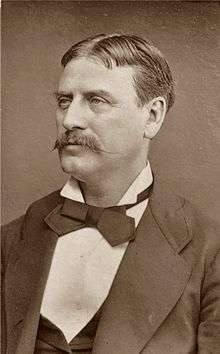Hervé (composer)

Hervé (French pronunciation: [ɛʁve]), real name Louis Auguste Florimond Ronger, (30 June 1825 – 4 November 1892)[1] was a French singer, composer, librettist, conductor and scene painter, whom Ernest Newman, following Reynaldo Hahn, credited with inventing the genre of operetta in Paris.[2]
Life
Hervé was born in Houdain near Arras. Part Spanish by birth, he became a choirboy at the Church of Saint-Roch, Paris. His musical promise was noted, and he was enrolled in the Conservatoire and studied with Daniel Auber, and by the age of fifteen was serving as organist at Bicêtre Hospital and a stage vocalist in provincial theatres, where he trained his fine tenor voice. He won a competition in 1845 for the prestigious Paris post of organist at the Church of Saint-Eustache, while he doubled with his theatrical music career, a situation that he turned to advantage years later, in his most famous work, 'Mam'zelle Nitouche.
Before he became musical director of the Théâtre du Palais Royal in 1851, he composed a one-act tableau grotesque, a burlesque on Don Quixote titled Don Quichotte et Sancho Pança. It was conceived as a vehicle for the actor Desiré, who was short and plump, accompanied by the tall and gangling Hervé, as he was now calling himself, in order to distance his two personas. It was staged at Adolphe Adam's Opéra-National, and achieved a great success in 1848, in spite of the distracting revolution: furthermore, according to the composer Reynaldo Hahn, the farcical pot-pourri was "simply the first French operetta".[3] He had also composed musical entertainments to keep the patients entertained at the Bicêtre Hospital, and these gained the notice of producers.[4]
Thus Hervé was the founder of a new era of French operettas. Through his Folies concertantes, a small theater stage he took over in 1854 and for which he wrote many works, he became the forerunner of the Théâtre des Bouffes Parisiens of Jacques Offenbach, whose early efforts he produced at his theatre, renovated as the Folies-Nouveaux. The restrictive license of the Folies concertantes permitted only spectacles-concerts, with no more than two characters, in a single act, stringencies imposed on Offenbach as well, but which encouraged Hervé to experiment with genres, before more flexible rules were established in the following decade. A jealous rivalry soon developed between Hervé and Offenbach, which was only patched up in 1878, when Hervé sang in a revival of Offenbach's Orphée aux enfers. He died in Paris.
.jpg)
Works
Hervé wrote more than a hundred and twenty operettas,[5] among which were:
- Les folies dramatiques (1853), with two other librettists, which parodied all the forms of entertainment in Paris, comedy, tragedy, vaudeville, ballet and opera.
- Les chevaliers de la Table Ronde (Bouffes Parisiens, 17 November 1866)
- L'œil crevé (Folies-Dramatiques, 12 October 1867)[6]
- Chilpéric (1868)
- Le petit Faust (1869)[7]
- Les Turcs (1869)
- Le trône d'Écosse (1871)
- La veuve du Malabar (1873)
- La belle poule (1875)
- Lili (1882)
- Mam'zelle Nitouche (1883)
References
- ↑ The information in this article, based on a translation of its German Wikipedia equivalent, is supplemented by the account of Hervé's career in Richard Traubner, Operetta: A Theatrical History 2003:20ff
- ↑ Ernest Newman, in Louis Biancolli, ed. The Opera Reader (New York: McGraw-Hill) 1953:317.
- ↑ Quoted with reservations, for the term had already been used, by Traubner 2003:20.
- ↑ Lubbock, Mark. "The Music of 'Musicals'". The Musical Times, Vol. 98, No. 1375 (September, 1957), pp. 483–85, Musical Times Publications Ltd., accessed 17 August 2010
- ↑ Taubner 2003.
- ↑ Richard Traubner, Operetta: A Theatrical History 2003:22. It was produced in New York in 1868, at J. Grau's Theatre Français, as The Pierced Eye and its libretto published. It was a success too in Vienna and in London.
- ↑ Information about Little Faust on Broadway
External links
| Wikimedia Commons has media related to Hervé (composer). |
- Hervé at the Internet Movie Database
- Free scores by Hervé at the International Music Score Library Project